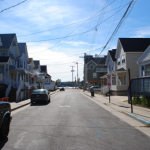Individual Property Owners Prefer Community-Based Post-Sandy Rebuilding Efforts But Are Skeptical They’ll Happen
A yearlong study funded by the New Jersey Recovery Fund and conducted by researchers at the Edward J. Bloustein School of Planning and Public Policy at Rutgers University has found that individual property owners in Sandy-affected towns are skeptical about the likelihood of community-based rebuilding solutions. Of the more than 400 online survey respondents, 45 percent indicated they were “pessimistic” or “very pessimistic” that the parts of their town affected by Superstorm Sandy would be rebuilt better than they were before the storm; another 24 percent were “not sure.” In total, 67 percent of survey respondents were “not sure.”
The study directly engaged the populations of Sea Bright, Highlands, and Sayreville, N.J., as well as surrounding municipalities. Carlos Rodrigues, principal of Rodrigues Urban Design and a part-time lecturer at the Bloustein School, noted that resident input came from participatory discussion meetings, as well as an online visual preference survey, which presented visual simulations of alternative rebuilding strategies for each of the three study communities. In this way, the study team was able to rank order and assess the degree of residents’ preferences for various rebuilding strategies of their individual properties.
Survey director Marc Weiner, Bloustein School research professor and associate director of the Bloustein Center for Survey Research, said that of those who responded to the online survey, 64 percent sustained property damage, with almost 80 percent of those respondents sustaining damage to the home in which they live full time. Of that group, 63 percent indicated an intention to elevate and repair their property, with over one-in-five indicating they would repair their property, leaving the structure at the same elevation as it was at the time of Superstorm Sandy.
These percentages are notable against the finding that 61 percent of the more than 400 respondents indicated it was “very” or “somewhat” likely that another storm with the effect of Sandy would occur in the next 10 years, with 90 percent indicating that same likelihood within the next 100 years.
Study director Clinton Andrews, a professor of urban planning at the Bloustein School, drew two conclusions. First, he noted that community-based solutions are generally superior to patchwork rebuilding efforts by individual property owners. Second, these are unlikely to be realized absent reform of legal and policy disincentives that are preventing coordinated planning, local land use decisions and rebuilding.
Anton Nelessen, professor of urban planning and fellow research team member, nonetheless found grounds for optimism. He noted that a positive finding of the online visual preference survey was apparent wide agreement on what residents would like their towns to look like in the future. Interested readers can view the spectrum of design alternatives that residents considered in a series of YouTube videos prepared by Nelessen.

